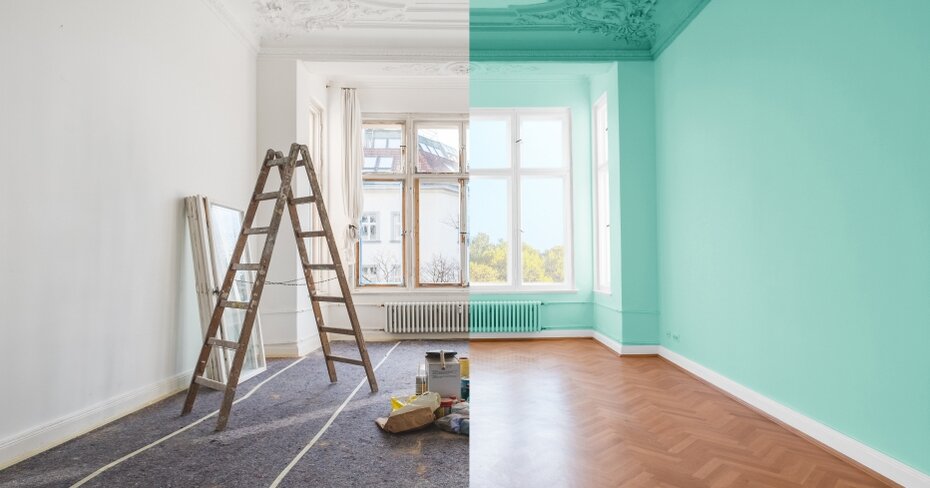Should you renovate your home during a recession?
By: Ritika Sharma on July 20, 2023
While analysts were predicting an economic recession earlier this year, the Canadian economy has proved resilient and performed better than expected. Despite interest rate hikes and inflation, household spending and labour markets continue to be strong.
Economists are now reassessing the likelihood of a recession – while some say a recession is oncoming; others predict it will arrive later than previously expected, in 2024. However, there’s no denying that the current inflationary state of the economy has pushed living costs – everything from groceries to mortgage payments – up to levels of near unaffordability.
In fact, Canadians are reporting record-levels of insolvency, and are finding it harder and harder to cover their bills.
In a downward economy, it may not seem like a good idea to renovate or remodel your home. Or is it?
When should you consider renovating or remodelling your home?
According to a recent survey conducted by Financeit, a Canadian lending company, 39 per cent of Canadians plan on postponing or reducing the scope of their renovation, while 18 per cent plan on postponing their renovation plans for at least 12 months or indefinitely.
The first thing to consider is whether the renovation can wait. Some renovations are essential and cannot be ignored for long – even with budgetary constraints. For instance, a leak in your roof or foundational repairs like a cracked wall. A minor repair can prevent a bigger disaster, and the possibility of you having to shell out a lot more at a later stage.
Cosmetic renovations, whether major ones like replacing kitchen titles or minor ones like painting the walls, may be able to wait — unless you plan on selling your home.
When you’re thinking of moving
Mary Shadd, a real estate agent with Loving Life Real Estate Team notes that renovations can help maintain or increase the value of your property. “Renovations that address structural issues, enhance energy efficiency, or improve functionality are typically wise investments,” she says.
For instance, a basement remodel is not only functional, but it also provides a good return on investment – with a mid-range remodel, you can recover about 70 per cent of the price.
Before embarking on a renovation project, Shadd suggests speaking with a realtor to determine which renovations will bring you the best return on investment.
But even if you’re only considering moving, for many Canadians, renovations to an old home may be a more feasible option – rather than having to move out in times when rental prices or mortgage payments are skyrocketing.
Related: The best home renovations that pay off at resale
When the price is right
Some other reasons why you should consider remodelling or renovating your home during a tough economic time may be:
Lower contractor prices: Renovations during a recession are more affordable. Generally, during times of economic hardship, services see decreased demand and subsequently, lower contractor prices.
Lower material costs: Construction slowdown leads to a decrease in building material costs. This means you might get certain building materials for cheaper than usual, resulting in an overall lower price for remodelling or renovations.
Faster completion times: During a recession, you may be able to get renovations done better and faster. With fewer construction projects going on, there may be a greater supply of high-quality contractors who can complete your home renovation project faster, and with better results.
However, one word of caution when hiring contractors during lean times is to make sure they have expertise in residential remodelling.
Impact of renovations on your home insurance
Beyond notifying your realtor, it is also important to keep your home insurance company in the know about your plans. Making changes to your home can impact your insurance coverage.
According to one report, 55 per cent of respondents said that they were not aware they should contact their insurance company and did not do so. Another nine per cent said they were aware they should notify their insurance company but didn’t. Finally, 35 per cent of respondents said they were aware and contacted their insurance company.
Whether it’s a significant renovation project or a minor upgrade, it affects your home's value, and subsequently, your home insurance coverage. To better understand the implications of any renovation, speak to your home insurance company before starting any renovation project.
“By discussing the project with your agent, you can learn how remodelling might change your home insurance premium,” says Jess Campbell, a London, Ontario-based insurance broker. “They can also guide you on what kind of renovation to go ahead with for maximum savings on a premium.”
Additionally, if you do not report any upgrades to your insurance company, you may be denied claims at crucial times.
Refinancing your home after renovations
Another aspect to consider when undertaking a renovation is the potential impact on refinancing options. A newly renovated home can give you more leverage if you decide to refinance your mortgage due to the increased value of the home. However, nothing is a sure bet, especially during uncertain economic times.
“Before refinancing, consult financial experts and mortgage professionals to evaluate its feasibility,” Campbell explains. “Factors such as interest rates, creditworthiness, and the potential risks associated with a recession must be thoroughly assessed.”
“Taking a prudent approach can help homeowners make informed decisions about refinancing and its impact on their financial well-being,” she adds.
Ultimately, the decision to renovate or remodel a home requires careful evaluation of your personal circumstances and the urgency of repairs or renovations. Seek professional guidance from a realtor and a credible contractor, and your insurance company so that you can make well-informed choices regarding your home and financial future.
Save 32% on average on home insurance
Compare 50+ quotes from Canadian providers in 3 minutes.


